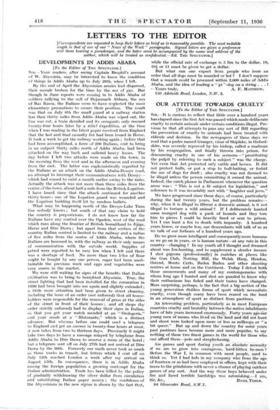' DEVELOPMENTS IN ADDIS ABABA
LETTERS TO THE EDITOR
[Correspondents are requested to keep their letters as brief as is teasonably possible. The most suitable length is that of one of our " News of the Week " paragraphs. Signed letters are given a preference or& those bearing a pseudonym, and the latter must be accompanied by the name and address of the author, which will be treated as confidential.—Ed. THE SPECTATOR.] [To the Editor of THE SPECTATOR.] SH2,—Your readers, after seeing Captain Brophil's account of W. Abyssinia, may be interested to know the condition of things in Addis Ababa up to July 29th, when I left.
By the end of April the Abyssinian armies had dispersed, their morale broken for the time by the use of gas. But though in June reports were coming in to Addis Ababa of soldiers rallying to the call of Dejazmach Abbara, the son of Has Kassa, the Italians seem to have neglected the most elementary precautions to secure their position. The result was that on July 6th the small guard at a railway station less than thirty miles from Addis Ababa was wiped out, the line was cut, a train derailed and its occupants only rescued twenty-four hours later by a relief expedition, at the time when I was reading in the latest paper received from England that the last and final casualty list had been issued in Rome. It took a week to get the railway working again ; before that had been accomplished, a force of 200 Italians, sent to bring in an outpost thirty miles north of Addis Ababa, hid been attacked on the way back and suffered heavy losses. The day before I left two attacks were made on the town, in the morning from the west and in the afternoon and evening from the east. The latter was euphemistically reported by the Italians as an attack on the Addis Ababa-Dzssye road, an attempt to interrupt their communications with Dessye- which had ceased to exist a month earlier owing to the rains. Actually the attack was not more than three miles from the centre of the town, about half a mile from the British Legation. I have heard since' that the attack continued for another thirty hours ; one of the Legation guard was wounded and the Legation building itself hit by random bullets.
What may be happening north of the Dessye-Lake Tana line nobody knows ; but south of that any claim to hold the country is preposterous. I do not know how far the Italians have any control over the Ogaden, west of the road which runs along the frontier of British Somaliland to Jijiga, Harar and Dire Dawa ; but apart from that section of the country Italian control is limited to the railway and a radius of five miles from the centre of Addis Ababa, where the Italians are hemmed in, with the railway as their only means of communication with the outside world. Supplies of petrol were reported to be very low when I left and there was a shortage of food. No more than two kilos of flour might be bought by any one person, sugar had been unob- tainable the previous week and eggs and vegetables were very scarce in the market.
We were still waiting for signs of the benefits that Italian civilisation was to bring to benighted Abyssinia. True, the street lighting that had been installed for the coronation in 1930 had been brought into use again and slightly extended ; a little more attention had been given to street cleaning, including the issue of an order (not enforced) that all house- holders were responsible for the removal of grass at the sides of the street in front of their houses ; and all shops (by order strictly enforced) had to display their signs in Italian, so that you got your watch mended at an " Orologeria," and your meals at a " Ristorante," which is a distinct advance. But whereas before one could send a telegram to England and get an answer in twenty-four hours at most, it now takes from two to thirteen days. Previously it might take two days to have a message relayed by telephone from Addis Ababa to Dire Dawa to reserve a room at the hotel ; but a telegram sent off on July 27th had not arrived at Dire Dawa by the 30th. Formerly our mails never took as much as three weeks in transit, but letters which I sent off on July 12th reached London a week after my arrival on August 15th. In consequence, there is in Addis Ababa among the foreign • population a growing contempt for the Italian administration. Trade has been killed by the policy of gradually withdrawing the silver dollar from circulation and substituting Italian paper money ; the confidence of the Abyssinians in the new regime is shown by the fact that, while the official rate of exchange is 5 lire to the dollar, 10, 10k or 11 must be given to get a dollar.
But what can one expect from people who issue an order that all dogs must be muzzled or led ? I don't suppose that a muzzle could be procured within 2,000 miles of Addis Ababa, and the idea of leading a "pi "-dog on a string . . . I,
--Yours truly, A. F. MATTHEW. 150 Adelaide Road, London, N.W. 3.












































 Previous page
Previous page